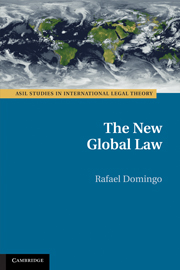Book contents
Conclusion: The Third Time Is the Charm
Published online by Cambridge University Press: 06 July 2010
Summary
After the Second World War, the conflicts of the Cold War, and the wreckage of September 11, a new global society cries out for a law that can order it according to its new global needs. If the ancient ius gentium served the hegemonic interests of Rome, and international law those of a state-based Europe, the new global law, based on the person, must contribute to the common good of humanity and to the development of world peace. The third time is the charm!
Global law is a ius pacis and not a ius belli. Although wars in the traditional sense of the term exist, we must use all the political and diplomatic means to avoid them. But once in war, the norms of international humanitarian law should be applied. Global law transcends the concept of war insofar as it no longer regards war as a legal tool for resolving conflicts. Hence we have referred to it only on occasion.
The new global law seeks the globalization of justice and the jurisdictional resolution of conflicts between peoples and persons. This does not entail that the use of armed force is eliminated for specific cases, but it may never be authorized by the will of a state, except in case of legitimate defense (vim vi repellere licet).
- Type
- Chapter
- Information
- The New Global Law , pp. 195 - 200Publisher: Cambridge University PressPrint publication year: 2010



